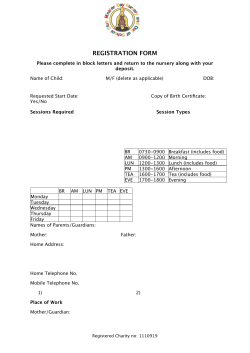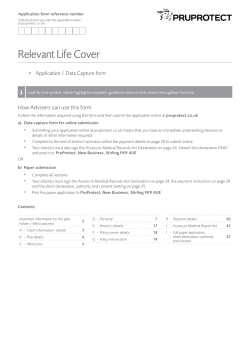
Acceptance of Credit Cards and Debit Cards
AMANS NSMFC FMCBC Recommended Practice Approved 2005 Acceptance of Credit Cards and Debit Cards The original recommended best practice was developed by the Government Finance Officers Association (GFOA). Some aspects of the practice have been revised by the Financial Management Capacity Building Committee (FMCBC) for use by Nova Scotia municipal governments. The original GFOA recommended practice is Acceptance of Credit and Debit Cards, approved by the GFOA’s Executive Board in 2008. Other sources used are footnoted in the text. Recommendations New methods of payment are being offered for taxpayers in various levels of government. The GFOA recommends that governments evaluate whether the acceptance of credit cards and debit cards as an option is reasonable and appropriate for the type of charge or fee being paid and the customer service level desired. The evaluation should consist of the following considerations: • Merchant discount fees. • Type of payment. • Administrative costs. • Benefits to government. • Comparable cost of processing payments. • Third party processors. Purpose Credit card and debit card acceptance has become extremely popular in the private sector. The use of credit cards and debit cards is extremely popular among the Canadian public for both large and small purchases. If a municipality decides to allow taxes, fees, or charges to be paid with credit or debit cards, greater convenience will result for the taxpayer. Because of the increased convenience, this can cause a reduction in payment default rates of taxes, fees, or charges. If a municipality is experiencing high default rates, different payment mechanisms may result in increased occurrences of payment. Also, a municipality may want to introduce credit and debit card payments to increase the efficiency of its payment method, and eventually remove cheque payments. FMCBC Recommended Practice: Acceptance of Credit Cards and Debit Cards, Page 1 AMANS NSMFC FMCBC Recommended Practice Approved 2005 Background Credit and debit cards have become an extremely popular method of payment in the private sector, especially in Canada. There is a growing trend moving away from cash and cheques and towards instant banking and credit cards. There are advantages and disadvantages to accepting credit card and debit card payments that municipalities need to weigh when deciding whether to accept payments by credit cards and debit cards. Considerations for Policy Development When municipalities are deciding whether or not to implement a new payment method including credit cards and debit cards, it must take into consideration certain factors. Municipalities should decide whether or not a new payment mechanism is actually necessary, and if the public would embrace the new payment mechanism (for further details, see Appendix I). Before deciding on introducing credit cards as a method of payment, municipalities should also examine the various factors associated with credit cards. There are various fees involved with credit cards that municipalities should be aware of before implementing it as a payment method (for further details, see Appendix II). Lastly, once a municipality has decided to adopt credit and debit cards as a method of payment, it must decide which credit cards to accept, and what type of Point of Sale (POS) terminal to use. When a municipality is deciding on which type to choose, it must follow the Agreement on Internal Trade in Nova Scotia. By following these guidelines, municipalities can ensure that they will select the most suitable terminal (for further details, see Appendix III). Appendices Appendix I: Factors to be Considered before Implementation Appendix II: Factors Associated with Credit Cards Appendix III: Credit and Debit Card Terminal Procurement FMCBC Recommended Practice: Acceptance of Credit Cards and Debit Cards, Page 2 AMANS NSMFC FMCBC Recommended Practice Approved 2005 Appendix I: Factors to be Considered before Implementation When a municipality is deciding whether or not to add the payment mechanism of credit and/or debit cards, it must first consider some important factors. Municipalities should also consider if the new payment program would be accepted. This could determine the success of the new payment program. Needs Assessment Before implementing the new tax payment method of credit and debit cards, the municipality should determine if a new payment method is beneficial. One method available is examining a municipality’s tax default rate. If the default rate is high, a new payment method may make it easier for the taxpayers to pay their taxes. However, if the default rate is low, a new payment mechanism may not be necessary. With the latter scenario, it may not be fiscally viable for a municipality to implement a new system when it is not particularly necessary. Level of Acceptance Another factor that should be considered is if the taxpayers will accept the new payment method. Even though the use of credit cards, and especially debit cards is high among Canadians, not all people are willing to accept this method of payment. For instance, taxpayer’s demographics should be considered. For example, if the municipality’s population is ageing, their use of credit cards and debit cards may be low, and thus these taxpayers may not be likely to start paying their taxes through these means. However, if the population demographic is diverse and the use of credit and debit cards is increasing, this payment method may be widely accepted. It is important for the municipality to consider if its constituents will embrace this new payment system. If the new system will not likely be accepted, the new program will probably not be successful. Municipalities should consider conducting a survey among its taxpayers to determine if the use of credit and debit cards would be a popular new method of tax payment. Also, municipalities could consider the level of use of credit and debit cards in the private sector in its constituency to consider the potential level of acceptance. FMCBC Recommended Practice: Acceptance of Credit Cards and Debit Cards, Page 3 AMANS NSMFC FMCBC Recommended Practice Approved 2005 Appendix II: Factors Associated with Credit Cards Credit card companies establish a service fee for the transaction and use of the credit card. Many credit card agreements prohibit municipalities from passing the service fee onto the taxpayers. Depending on which credit card company the municipality decides to accept, the company may decide to offer other incentives to curb the service fee. For example, in addition to the service fee, a credit card company may offer incentives, such as points towards various products and air miles. A market does exist for paying taxes with credit cards; however, the service fee appears to be municipalities strongest deterrent against implementing a credit card payment program. FMCBC Recommended Practice: Acceptance of Credit Cards and Debit Cards, Page 4 AMANS NSMFC FMCBC Recommended Practice Approved 2005 Appendix III: Credit and Debit Card Terminal Procurement When deciding on which company or bank to hire to provide the credit card and debit card terminal (called Point of Sale (POS) terminals), the municipality should consult the Agreement on Internal Trade for the Province of Nova Scotia. Municipalities are not required to follow Nova Scotia’s Procurement Process, however, if a municipality wishes to seek assistance, the Provincial Procurement Branch will provide support. If municipalities would like to contact the Provincial Procurement Branch, see http://www.gov.ns.ca/tenders/. Municipalities should be familiar with the Atlantic Procurement Agreement and the Agreement on Internal Trade in Nova Scotia. Municipalities should also be familiar with Nova Scotia’s procurement policies when procuring credit and debit card terminals. http://www.gov.ns.ca/tenders/policy/pdf_files/ProcurementPolicy.pdf. FMCBC Recommended Practice: Acceptance of Credit Cards and Debit Cards, Page 5 AMANS NSMFC FMCBC Recommended Practice Approved 2005 References “Credit Card Companies are Trying to get People to Pay Taxes with their Credit Cards”. News Target. March 23, 2005. “Credit Experts are Alarmed at Americans’ New Tendency to Pay Taxes by Credit Card”. News Target. March 23, 2005. Government Finance Officers Association. Acceptance of Credit Cards, Approved 2008. http://www.gfoa.org/downloads/AcceptanceofCreditDebitCardsFINAL.pdf. Department of Economic Development Procurement Services. “Province of Nova Scotia Procurement Policy”. Province of Nova Scotia. http://www.gov.ns.ca/tenders/policy/pdf_files/ProcurementPolicy.pdf. “Paying Taxes by Credit Card Remains Stagnant: American Taxpayers Frightened by Fees, Continue Resistance for Second Year of Ipsos-Insight Survey”. IpsosInsight. April 6, 2005. FMCBC Recommended Practice: Acceptance of Credit Cards and Debit Cards, Page 6
© Copyright 2025





















